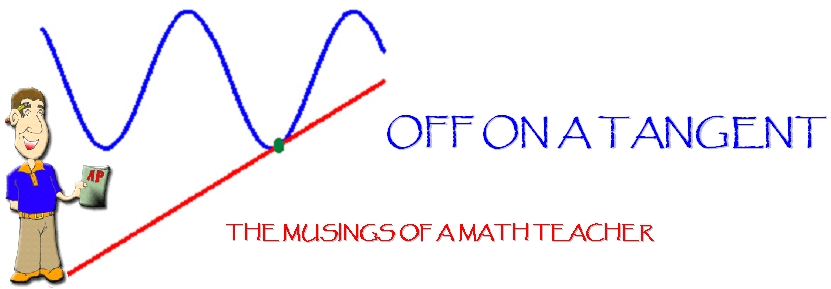 In teaching mathematics, I hope that students become more than just proficient with effective methods of practice. In the real world, getting the correct answer is the ultimate goal (who wants to drive over a bridge where only 70% of the structural calculations are correct?), but there are also deadlines in the real world that have to be met.
In teaching mathematics, I hope that students become more than just proficient with effective methods of practice. In the real world, getting the correct answer is the ultimate goal (who wants to drive over a bridge where only 70% of the structural calculations are correct?), but there are also deadlines in the real world that have to be met.In this sense, there are really two factors at play: effectiveness AND efficiency. Students must learn to work toward the correct solution, but also to do it under a time-pressured environment, an environment that rewards a concise, efficient solution. There are numerous ways to solve any particular problem, some are more direct, while others are more "scenic," while some are not even intuitive. So how do we as teachers encourage exploration of concepts and difficult, multi-stepped problems, which obviously require a substantial amount of time to grasp, wrestle with, and try new approaches, while insisting that students perform a comprehensive test or quiz in a prescribed amount of time? The answer is quite easy. Homework, Socratic lectures, and class activities are the primary vehicles for the tedium of drawn out examination. Students must learn to practice on their own so that they feel comfortable with their new-found discoveries, methods, and insights, so that when it comes time for the test or exam, all they need to do is apply their newly acquired skills.
I don't think any civil or structural engineer (who is employed by anyone) would ever show up to the jobsite and begin building that bridge without having first invested hours and hours in his office laboring over every detail of blueprints, specs, revisions, and revisions to addendums to revisions. He has built the bridge repeatedly in his head and on paper, anticipating situations and potential problems. In other words, the bridge building activity is NOT the practice. Now certainly, an engineer who has done his homework will likely be highly solicited for his expertise, which generates more experience, which yields more expertise, which makes him increasingly effective, efficient, and filthy rich.
I'll admit that there is no such monetary incentive for students to do their math homework, nor is there the possibility of sizable penalties and pecuniary lawsuits for the collapse of their "bridges," but assiduous habits formed now are habits that will eventually put the student in the position to build that bridge.
But before they become efficient, them must learn to be effective. This means going slowly in the beginning. It is much easier to speed up once we've learned it correctly than it is to slow down and learn it over. My son learns piano this way, not that I'm fond of hearing "Yankee Doodle Dandy" played at a snail's pace, but hitting the right notes in a slower rhythm is imperative to learning the right notes at the proper speed. Just as he gets faster playing a piece once he's learned it well, math students get naturally faster at problems and procedures, after they've struggled with it, stretched into it, and really learned it.Ironically, the students who often have the biggest struggle learning as the math gets harder, are the ones to whom it came quickly. Not only do they not know how to slow down, but they don't think they're supposed to. They think deep thinking, struggle, and the need to take more time indicates a problem, when in fact, it's the best way to learn math.
Motivated students should embrace challenging, multi-stepped problems from which they can develop mathematical stamina and learn general methods. One of the biggest problem students face is a lack of stamina to really delve into their problems. If the answer is more than a "click" away, they lose interest and return to their X-box. As teachers and parents, we must help students to develop a patient pertinacity and praise them for rolling up their sleeves and staying with the problem, especially when they are so frustrated that feel their pencil surpasses them in intelligence. THIS is the true value of mathematics: the vigor it adds to the mind, the problem-solving insight we gain, and the habits of mind we create. All these skills transcend the classroom, and will help students in any pursuit or endeavor, whether they are building a bridge, a family, a relationship, or a submarine sandwich.
As the great philosophical mathematician Alfred North Whitehead quipped, "The study of mathematics is apt to commence in disappointment." He is correct, but there is a flip side to the "math is hard" coin: those who actually invest the effort and develop their mathematical abilities develop unshakable confidence and a reassuring comfort that they are equipped to handle anything the world should through at them.


No comments:
Post a Comment